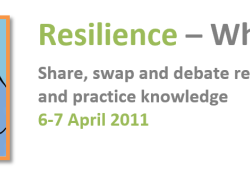Topic: Tackling health inequalities: Exploring the potential of practice theory – Kay Aranda and Angie Hart, University of Brighton
Resources: You can download the slides.
Session summary: Resilience as a strength, asset or solution focused approach to address health inequalities has become popular, but we know resilience can remain individualising and conservative in effect, rather than constituting a critical challenging radical practice required to transform. In this session I want to explore the potential of reframing resilience practice through the ‘practice turn’ in social theory. Practice theory’s main contribution is to foreground action and affect but with ‘stuff’ or the material world. This is being thought to be especially valuable for re-thinking health and professional learning.
To reframe resilience as a social practice means we attend to the elements comprising practices as elements form a bridge between practices-as-performances (meanings, materials and competencies) and practices-as-entities (constituted through integrations). Theorising resilience as a social practice means it then becomes historically and culturally situated but conceived as entangled with the material world, and importantly, other practices. It makes visible the active, affective and material composition of the work, but then deepens our understanding of how these come together and circulate in particular ways. This framing potentially provides deeper understandings of how we move beyond individualising practices to effect social change.
Biography: I am based in the School of Nursing and Midwifery and have taught, researched and worked with a range of practitioners in the field of inequalities in health for over 30 years. And despite substantial evidence of the causes, the numerous policies and initiatives, inequalities remain. This frustration often leads me back to theory. Using practice theory, I hope to disturb old stories of inequality and generate different understandings with which to rethink inequalities practices and reimagine change. I am still exploring and learning about practice theory so would very much welcome critical discussion, dialogue and debate.
Most interested: Academics, researchers, practitioners.
Key readings: Shove, E., M. Pantzar, et al. (2012). The dynamics of social practice: everyday life and how it changes. London, Sage.
Reckwitz, A. (2002). “Towards a theory of social practices.” European Journal of Social Theory 5(2): 243-263.
Schatzki, T. R., K. Knorr Cetina, et al., Eds. (2001). The Practice Turn in Contemporary Theory. London, Routledge.
This session took place on Wednesday 16 October 2013.
The Resilience Forum is for ANYBODY (with a pulse!) involved with or interested in resilience research!


